Unit 7 Have you ever been to a museum Section A 课件(共41张PPT)
文档属性
| 名称 | Unit 7 Have you ever been to a museum Section A 课件(共41张PPT) |
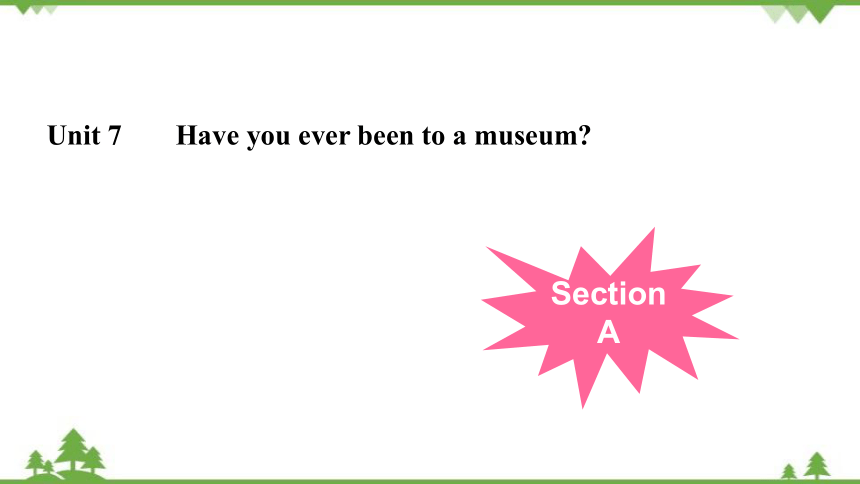
|
|
| 格式 | ppt | ||
| 文件大小 | 4.8MB | ||
| 资源类型 | 教案 | ||
| 版本资源 | 鲁教版 | ||
| 科目 | 英语 | ||
| 更新时间 | 2022-11-08 15:24:21 | ||
图片预览

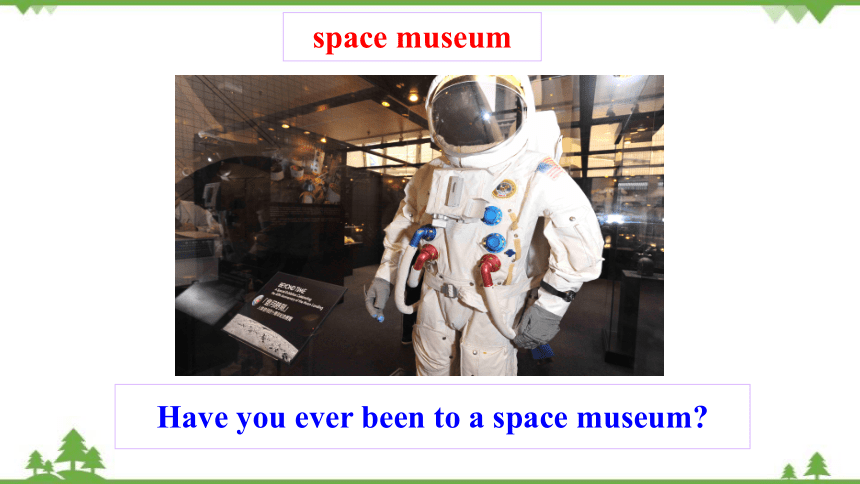
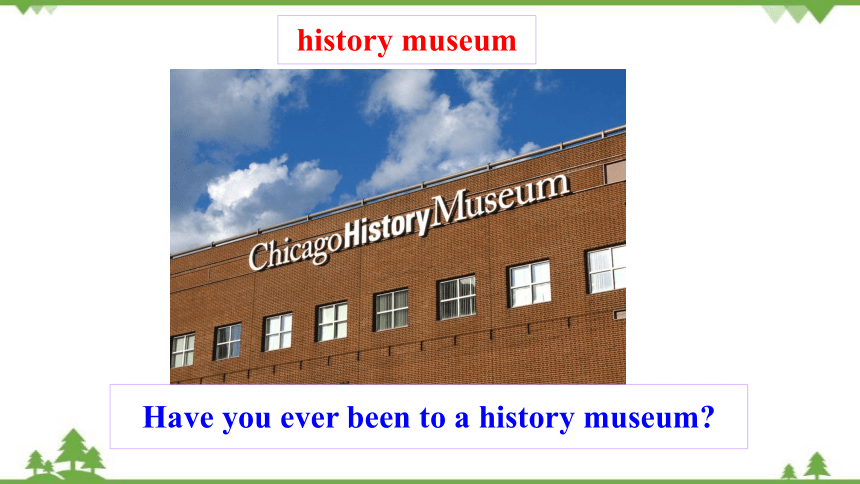

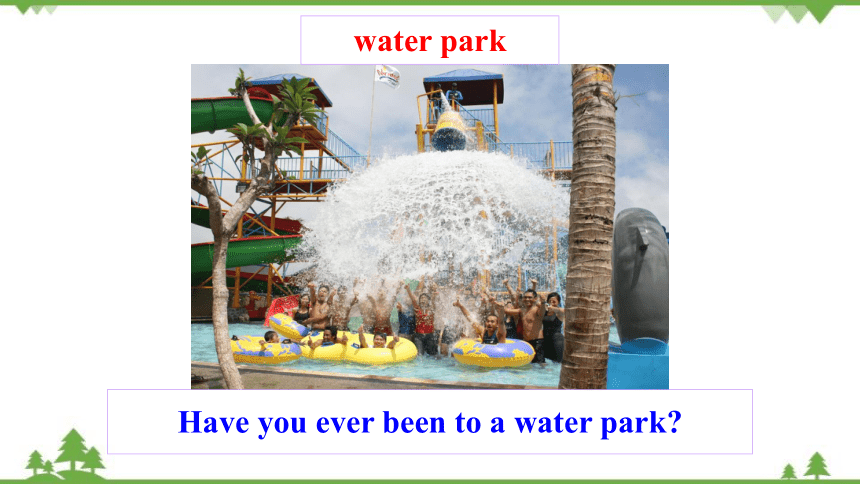
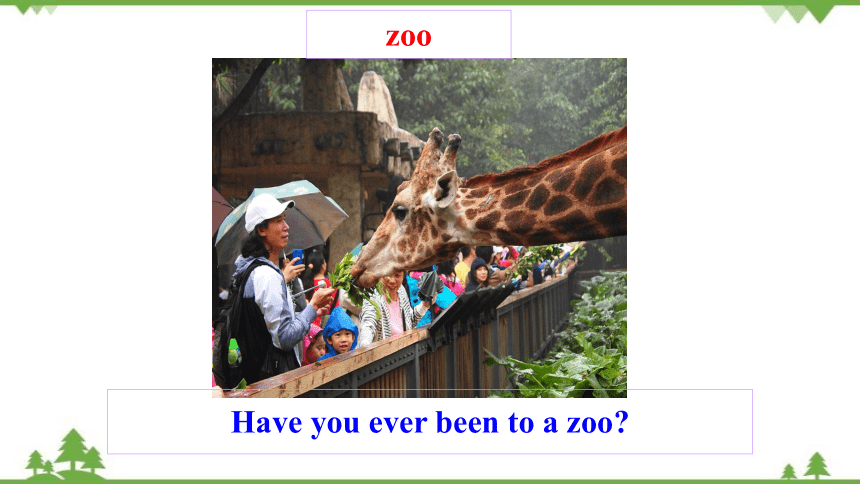
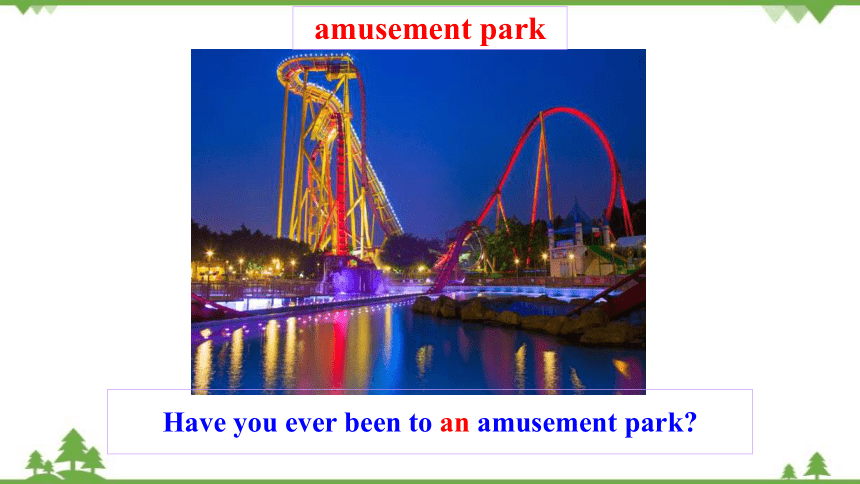
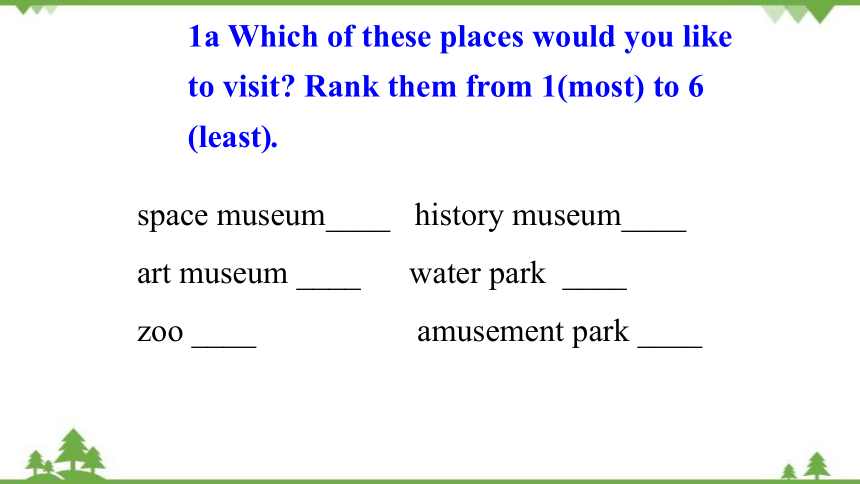
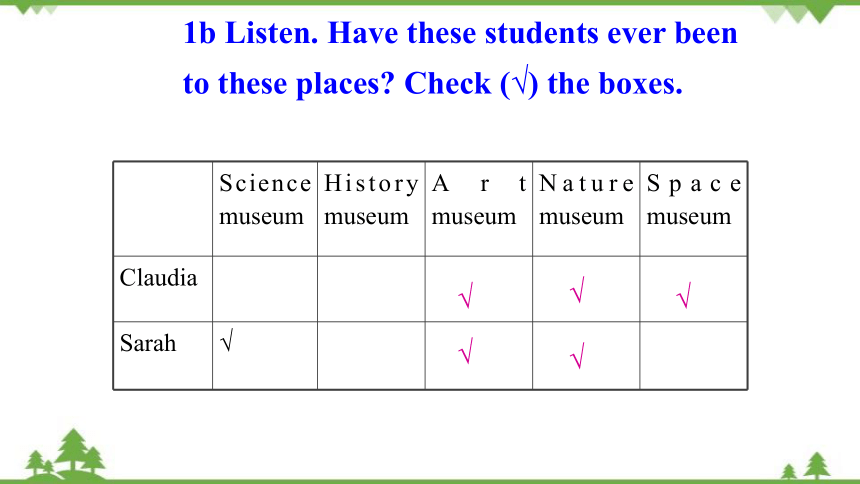
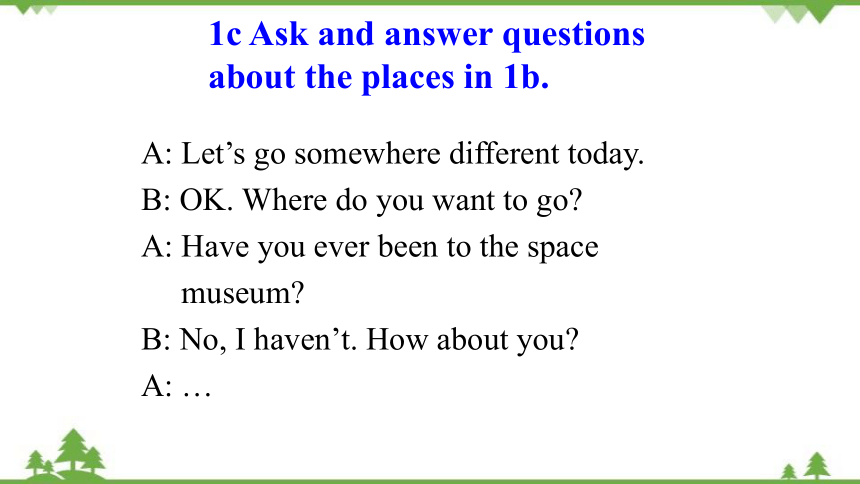
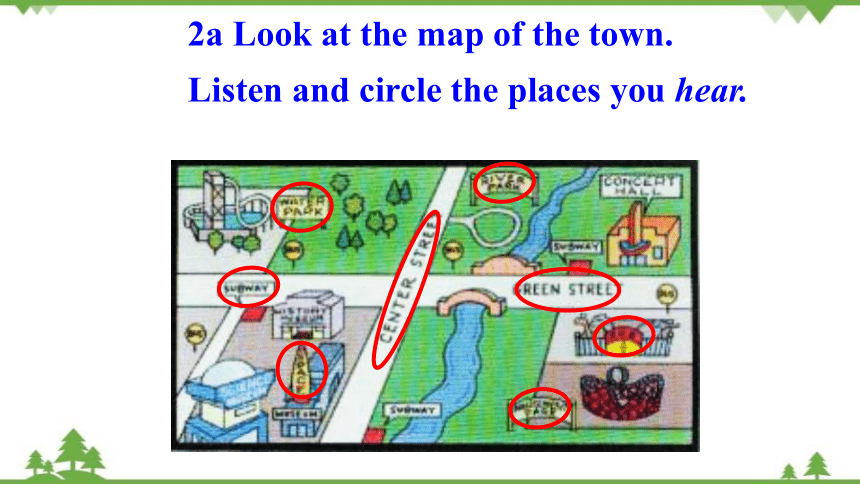
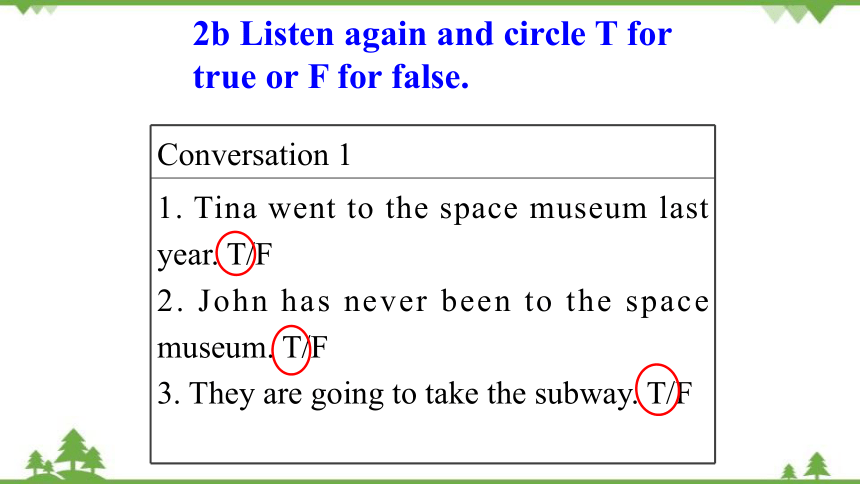
文档简介
(共41张PPT)
Unit 7 Have you ever been to a museum
Section A
space museum
Have you ever been to a space museum
history museum
Have you ever been to a history museum
art museum
Have you ever been to an art museum
water park
Have you ever been to a water park
zoo
Have you ever been to a zoo
amusement park
Have you ever been to an amusement park
1a Which of these places would you like to visit Rank them from 1(most) to 6 (least).
space museum____ history museum____
art museum ____ water park ____
zoo ____ amusement park ____
Science museum History museum Art museum Nature museum Space museum
Claudia
Sarah √
√
√
√
√
√
1b Listen. Have these students ever been to these places Check (√) the boxes.
1c Ask and answer questions about the places in 1b.
A: Let’s go somewhere different today.
B: OK. Where do you want to go
A: Have you ever been to the space
museum
B: No, I haven’t. How about you
A: …
2a Look at the map of the town. Listen and circle the places you hear.
Conversation 1
1. Tina went to the space museum last year. T/F
2. John has never been to the space museum. T/F
3. They are going to take the subway. T/F
2b Listen again and circle T for true or F for false.
Conversation 2
1. Linda has been to the amusement park. T/F
2. Linda went to the amusement park yesterday. T/F
3. Linda is going to the amusement park again by bike. T/F
Conversation 3
1. Frank had a great time at the water park. T/F
2. Frank’s friend has never been to the water park. T/F
3. Frank and his friend are going skating. T/F
2c Look at the map in 2a and make conversations about the places.
A: Have you ever been to the space museum
B: Yes, I have. How about you
A: No, I haven’t.
B: Oh, it’s fantastic. Let’s go tomorrow.
A: OK. How are we going to get there
B: We can take the subway.
2d Role-play the conversation.
I went to the film museum last weekend. Have you ever been there …
Yes, I have. I went there back in April. …
1. Which three museums do the students
talk about
The American Computer Museum, the
International Museum of Toilets and
Hangzhou National Tea Museum.
Read the article and answer the following questions.
2. What do you think is the most
interesting thing about each museum
The American Computer Museum:A special computer that can play chess better than humans
The International Museum of Toilets:Different kinds of toilets
Hangzhou National Tea Museum:The tea art performances show how to make a perfect cup of tea
3. What does Ken say about the American Computer Museum
It’s unbelievable that technology has progressed in such a rapid way.
4. What can we learn at the International Museum of Toilets
We can learn the history and development of toilets.
5. Why is the Hangzhou National Tea Museum a nice place to enjoy tea
Because it’s a relaxing and peaceful place near a lake.
3c Which of the underlined words in the passage have the following meanings
progress
rapid
unusual
peaceful
improve
invented
make sth. better
become better
uncommon
quiet
made
quick
Have you ever been to a science museum
Yes, I’ve been to a science museum./
No, I’ve never been to a science museum.
Have you ever visited the space museum
Yes, I have. I went there last year./ No, I
haven’t.
Grammar Focus
I’ve been to the art museum many times.
Me, too. And I’ve also visited the nature museum.
I’ve never been to a water park.
Me neither.
Have you had your lunch yet
Yes, I have. I have just had it. (现在我不饿了) 表示过去发生或已经完成的动作对现在造成的影响或结果。
现在完成时的用法
I have already taught him some English.
John has never been to the space museum.
My boy has just started junior high school. 现在完成时常与时间副词already, never, ever, just, before, yet等连用。
ever 意为“曾经”,用于疑问句或否定句中,放在助动词与过去分词之间。
eg:Have you ever been to Hong Kong
你曾去过香港吗? I haven’t ever spoken to her.
我未曾和她说过话。
never意为“从来没有”常与before连用,多放在助动词与过去分词之间。
eg: I have never travelled by plane before.
我以前从来没有乘飞机旅行过。
1. 一般过去时只强调过去的动作;现在完成时强调过去的事情对现在的影响。
2. 一般过去时通常与表示过去的时间状语连用;现在完成时则不能与表示过去的时间状语连用。
3. 一般过去时单纯表示过去的经历;现在完成时表示过去的动作或状态延续到现在并可能持续下去。
一般过去时与现在完成时的区别
一般过去时的时间状语有:yesterday, last week, … ago, in1980, in October, just now …
共同的时间状语有:this morning, tonight, this summer, before, already, …
现在完成时的时间状语有:for, since, ever, never, just, already, yet, in past years …
4a Put the correct forms of the verbs in the blanks.
1. A: Do you want ________ (come) to the space museum
B: No, I’ve already ______ (be) there three times.
2. A: Have you _____ (see) the robots at the science museum
B: Yes, I _____ (go) there last weekend.
to come
been
seen
went
3. A: Let’s _______ (spend) the day at the zoo.
B: Well, I’ve already ______ (be) there a couple of times, but I’m happy _______ (go) again.
4. A: How about ______ (go) to the art museum There are some special German paintings there right now.
B: Sure. When do you want _____ (go)
spend
been
to go
going
to go
5. A: Have you ever _______ (visit) the history museum
B: No, I’ve never ______ (be) there.
visited
been
4b Fill in the blanks with the correct forms of the verbs in brackets.
Most of us ____________ (see) Mickey Mouse, Donald Duck and other famous Disney characters in cartoons before. But have you ever ______ (be) to Disneyland Disneyland ______ (be) an amusement park with a special theme — Disney characters and movies.
have seen
been
is
There _____ (be) many exciting rides, lovely restaurants and fantastic gift shops there. You can also _____ (see) the Disney characters walking around the park. And have you ever _______ (hear) of a Disney Cruise This ______ (be) a boat ride with a Disney theme. You can ______ (take) a ride on the boat for several days and eat and sleep on it.
are
see
heard
is
take
On the boat, you can ______ (shop) and have Disney parties before you ________ (arrive) at the Disney island.
shop
arrive
4c Answer the survey questions and then ask your partner.
Have you ever ... You Your partner
been to another province in China
lost something important
1. I learned about the inventions that led to color movies, too. 我还了解了一些发明,它们成就了彩色电影。
此处learn是“了解;获知;得知”的意思,由介词about或of引入所获知的具体内容。
eg:The children were all shocked to learn of the death of their headmaster.
得知校长去世,孩子们都十分震惊。
Language Points
2. I’ve never been camping.
我从未野营过。
此句为现在完成进行时。这一时态的结构为“have been + 现在分词”,表示从过去某一时刻延续至今的动作。在本句中,说话人使用这一时态来强调自己至今从未有过野营的经历,欠缺这方面的经验。
eg:He’s been watching TV all afternoon.
他一下午都在看电视。
3. I wonder how much more computer will be able to do in the future.
不知道将来电脑还能够做些什么事情呢。
1)wonder 表示“ (对某事)感到疑惑;想要
知道;想弄明白;琢磨”,后面常接由what,
how, who 或者if/whether引导的宾语从句。
eg: I wonder how they’re getting on.
我想知道他们现在过得怎样。
I just wonder if they’ve arrived safely.
我就想知道他们是否安全抵达了。
2) 此句从句部分的原始结构是: How much more will computers be able to do in the future 是对陈述句Computers will be able to do (much) more in the future.(电脑将来能够做更多的事情。)的提问。由于充当了宾语从句, 疑问结构改成了陈述结构:
how much more computers will be able to do in the future, 即: 将助动词还原到陈述句的位置。
eg: I don’t know when he will come.
我不知道他什么时候来。
I don’t know where he lives.
我不知道他住在哪里。
4. Watching the tea preparation is just as enjoyable as drinking the tea itself.
看沏茶的过程和饮茶本身一样令人愉快。
-able是一个典型的形容词后缀, 可加在动词之后, 表示“可……的; 能够……的”。此处enjoyable(能使人快乐的; 令人愉快的) 便是一例, 再如:drinkable(可饮用的), washable(可洗的), readable(可读的), usable(可用的; 可使用的)等等。
1. Remember the language points.
2. Preview the next lesson.
Homework
Unit 7 Have you ever been to a museum
Section A
space museum
Have you ever been to a space museum
history museum
Have you ever been to a history museum
art museum
Have you ever been to an art museum
water park
Have you ever been to a water park
zoo
Have you ever been to a zoo
amusement park
Have you ever been to an amusement park
1a Which of these places would you like to visit Rank them from 1(most) to 6 (least).
space museum____ history museum____
art museum ____ water park ____
zoo ____ amusement park ____
Science museum History museum Art museum Nature museum Space museum
Claudia
Sarah √
√
√
√
√
√
1b Listen. Have these students ever been to these places Check (√) the boxes.
1c Ask and answer questions about the places in 1b.
A: Let’s go somewhere different today.
B: OK. Where do you want to go
A: Have you ever been to the space
museum
B: No, I haven’t. How about you
A: …
2a Look at the map of the town. Listen and circle the places you hear.
Conversation 1
1. Tina went to the space museum last year. T/F
2. John has never been to the space museum. T/F
3. They are going to take the subway. T/F
2b Listen again and circle T for true or F for false.
Conversation 2
1. Linda has been to the amusement park. T/F
2. Linda went to the amusement park yesterday. T/F
3. Linda is going to the amusement park again by bike. T/F
Conversation 3
1. Frank had a great time at the water park. T/F
2. Frank’s friend has never been to the water park. T/F
3. Frank and his friend are going skating. T/F
2c Look at the map in 2a and make conversations about the places.
A: Have you ever been to the space museum
B: Yes, I have. How about you
A: No, I haven’t.
B: Oh, it’s fantastic. Let’s go tomorrow.
A: OK. How are we going to get there
B: We can take the subway.
2d Role-play the conversation.
I went to the film museum last weekend. Have you ever been there …
Yes, I have. I went there back in April. …
1. Which three museums do the students
talk about
The American Computer Museum, the
International Museum of Toilets and
Hangzhou National Tea Museum.
Read the article and answer the following questions.
2. What do you think is the most
interesting thing about each museum
The American Computer Museum:A special computer that can play chess better than humans
The International Museum of Toilets:Different kinds of toilets
Hangzhou National Tea Museum:The tea art performances show how to make a perfect cup of tea
3. What does Ken say about the American Computer Museum
It’s unbelievable that technology has progressed in such a rapid way.
4. What can we learn at the International Museum of Toilets
We can learn the history and development of toilets.
5. Why is the Hangzhou National Tea Museum a nice place to enjoy tea
Because it’s a relaxing and peaceful place near a lake.
3c Which of the underlined words in the passage have the following meanings
progress
rapid
unusual
peaceful
improve
invented
make sth. better
become better
uncommon
quiet
made
quick
Have you ever been to a science museum
Yes, I’ve been to a science museum./
No, I’ve never been to a science museum.
Have you ever visited the space museum
Yes, I have. I went there last year./ No, I
haven’t.
Grammar Focus
I’ve been to the art museum many times.
Me, too. And I’ve also visited the nature museum.
I’ve never been to a water park.
Me neither.
Have you had your lunch yet
Yes, I have. I have just had it. (现在我不饿了) 表示过去发生或已经完成的动作对现在造成的影响或结果。
现在完成时的用法
I have already taught him some English.
John has never been to the space museum.
My boy has just started junior high school. 现在完成时常与时间副词already, never, ever, just, before, yet等连用。
ever 意为“曾经”,用于疑问句或否定句中,放在助动词与过去分词之间。
eg:Have you ever been to Hong Kong
你曾去过香港吗? I haven’t ever spoken to her.
我未曾和她说过话。
never意为“从来没有”常与before连用,多放在助动词与过去分词之间。
eg: I have never travelled by plane before.
我以前从来没有乘飞机旅行过。
1. 一般过去时只强调过去的动作;现在完成时强调过去的事情对现在的影响。
2. 一般过去时通常与表示过去的时间状语连用;现在完成时则不能与表示过去的时间状语连用。
3. 一般过去时单纯表示过去的经历;现在完成时表示过去的动作或状态延续到现在并可能持续下去。
一般过去时与现在完成时的区别
一般过去时的时间状语有:yesterday, last week, … ago, in1980, in October, just now …
共同的时间状语有:this morning, tonight, this summer, before, already, …
现在完成时的时间状语有:for, since, ever, never, just, already, yet, in past years …
4a Put the correct forms of the verbs in the blanks.
1. A: Do you want ________ (come) to the space museum
B: No, I’ve already ______ (be) there three times.
2. A: Have you _____ (see) the robots at the science museum
B: Yes, I _____ (go) there last weekend.
to come
been
seen
went
3. A: Let’s _______ (spend) the day at the zoo.
B: Well, I’ve already ______ (be) there a couple of times, but I’m happy _______ (go) again.
4. A: How about ______ (go) to the art museum There are some special German paintings there right now.
B: Sure. When do you want _____ (go)
spend
been
to go
going
to go
5. A: Have you ever _______ (visit) the history museum
B: No, I’ve never ______ (be) there.
visited
been
4b Fill in the blanks with the correct forms of the verbs in brackets.
Most of us ____________ (see) Mickey Mouse, Donald Duck and other famous Disney characters in cartoons before. But have you ever ______ (be) to Disneyland Disneyland ______ (be) an amusement park with a special theme — Disney characters and movies.
have seen
been
is
There _____ (be) many exciting rides, lovely restaurants and fantastic gift shops there. You can also _____ (see) the Disney characters walking around the park. And have you ever _______ (hear) of a Disney Cruise This ______ (be) a boat ride with a Disney theme. You can ______ (take) a ride on the boat for several days and eat and sleep on it.
are
see
heard
is
take
On the boat, you can ______ (shop) and have Disney parties before you ________ (arrive) at the Disney island.
shop
arrive
4c Answer the survey questions and then ask your partner.
Have you ever ... You Your partner
been to another province in China
lost something important
1. I learned about the inventions that led to color movies, too. 我还了解了一些发明,它们成就了彩色电影。
此处learn是“了解;获知;得知”的意思,由介词about或of引入所获知的具体内容。
eg:The children were all shocked to learn of the death of their headmaster.
得知校长去世,孩子们都十分震惊。
Language Points
2. I’ve never been camping.
我从未野营过。
此句为现在完成进行时。这一时态的结构为“have been + 现在分词”,表示从过去某一时刻延续至今的动作。在本句中,说话人使用这一时态来强调自己至今从未有过野营的经历,欠缺这方面的经验。
eg:He’s been watching TV all afternoon.
他一下午都在看电视。
3. I wonder how much more computer will be able to do in the future.
不知道将来电脑还能够做些什么事情呢。
1)wonder 表示“ (对某事)感到疑惑;想要
知道;想弄明白;琢磨”,后面常接由what,
how, who 或者if/whether引导的宾语从句。
eg: I wonder how they’re getting on.
我想知道他们现在过得怎样。
I just wonder if they’ve arrived safely.
我就想知道他们是否安全抵达了。
2) 此句从句部分的原始结构是: How much more will computers be able to do in the future 是对陈述句Computers will be able to do (much) more in the future.(电脑将来能够做更多的事情。)的提问。由于充当了宾语从句, 疑问结构改成了陈述结构:
how much more computers will be able to do in the future, 即: 将助动词还原到陈述句的位置。
eg: I don’t know when he will come.
我不知道他什么时候来。
I don’t know where he lives.
我不知道他住在哪里。
4. Watching the tea preparation is just as enjoyable as drinking the tea itself.
看沏茶的过程和饮茶本身一样令人愉快。
-able是一个典型的形容词后缀, 可加在动词之后, 表示“可……的; 能够……的”。此处enjoyable(能使人快乐的; 令人愉快的) 便是一例, 再如:drinkable(可饮用的), washable(可洗的), readable(可读的), usable(可用的; 可使用的)等等。
1. Remember the language points.
2. Preview the next lesson.
Homework
同课章节目录
- Unit 1 Could you please clean your room?
- Section A
- Section B
- Unit 2 Why don't you talk to your parents?
- Section A
- Section B
- Unit 3 What were you doing when the rainstorm came
- Section A
- Section B
- Unit 4 An old man tried to move the mountains.
- Section A
- Section B
- Unit 5 What's the highest mountain in the world?
- Section A
- Section B
- Unit 6 Have you read Treasure Island yet?
- Section A
- Section B
- Unit 7 Have you ever been to a museum?
- Section A
- Section B
- Unit 8 I've had this bike for three years.
- Section A
- Section B
